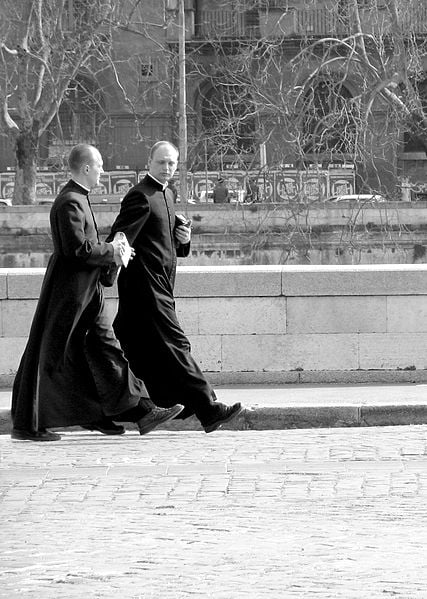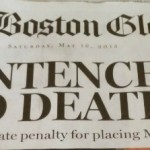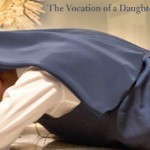
When I joined the convent, I informed my coworkers at the hip, tech company I worked for in San Francisco by sending them a link to the theme song for the TV show The Flying Nun.
After I sent out the email, a coworker gleefully asked me if I was leaving to become “one of those rad women priests.” I told her frankly that I was not and that I actually was (and am) fine with the Church’s stance on women’s ordination. Shocked that I could actually buy into the archaic, patriarchal norms of the Catholic Church the coworker ceased talking to me for the remaining two weeks I was there.
I don’t know about any other Catholic women out there but I am getting really tired of being pitied or thought a fool because I have no problem with the fact that I can’t be a priest. I’m especially getting tired of men telling me that I should feel oppressed and discriminated against because I belong to a Church in which there is a role that I cannot fulfill as a woman.
Talk about paternalism.
The thing is, I did not have a problem with women being barred from ordination when I was an atheist either. Even then, I could logically see that religion is an entirely different animal than the other institutions in modern society. If one truly believes that there are divinely revealed truths, then it is possible to believe that, for reasons one may not entirely understand at a certain point in history, God will ordain or design something that goes against the grain of the reigning tastes or ideals. I thought this was obvious even when, from the outside, it seemed clear to me that women should be able to be ordained and that God did not exist at all.
Now, from the inside, I see many new things.
For one, I see that women do things differently. Even if we do the same things, we do them differently because we bring to them the feminine genius of womanhood. In other words, men and women can and should do many of the same things. But they will always do them differently.
Just watch Taylor Swift’s new video “Bad Blood” and you’ll see what I mean. Women can be action heroes, just like men. We just do it differently (and with more style):
And perhaps God, realizing that, had it in his plan for women to act in our baptismal role as priests in a way that would be different from men. We, of course, can do many of the same things that priests do. But we do it differently. And this is what God has asked us to do in his Church.
The male priesthood is just one thread in a beautiful, intricate puzzle of salvation designed by the greatest artist of all, God. Remove one thread and it affects the entire work of art. Outwardly, male priests may look like an inequality, but inwardly it is simply in keeping with God’s artistic preferences as the just Creator of the Universe. As a religious sister, I see this even more clearly now because I see my own role in salvation, and I know that it is different than the role of an ordained priest.
There are both men and women religious in the Church, and we all are threads in the tapestry, but women religious have a beautiful role in the Church that cannot be replaced by anything a man could ever do. We are women religious, and our distinctly feminine way of relating to the world and to God’s people is irreplaceable. The thing is, no one seems to have a problem with me saying this. But if I said, “We are men and we are priests, and our distinctly masculine way of relating to the world and to God’s people is irreplaceable” then people would most likely object.
Why?
Because in the view of the world, priests have power and women religious do not. The hierarchy of the Church is male. Dogma is determined by males. No females allowed. This looks, on its face, unjust.
But from the inside, we know that in reality, no man is determining dogma. The Magisterium of the Church has a boss and it is the Holy Spirit. Priests are not holding the reins, they are just on the ride of salvation like everyone else. Their roles may differ from ours, but their degree of power should not.
I say should not, because we all know that we are human and the fact is that women have been oppressed and discriminated against since the beginning of time. The Church has not been miraculously immune to sexism. I still, at times, experience sexism as a woman religious. There are people in the Church who see the hierarchical structure of the Church and mistake the God-given design as an indication that men are somehow more valuable, more needed, and more deserving of respect than women. These sexist attitudes can be seen in the kind of “clericalism” that Pope Francis condemns outright. He once prayed:
Lord, free your people from a spirit of clericalism and aid them with a spirit of prophecy.
Why is clericalism linked to stifling prophecy? Because men and women are all called, in our own unique ways, to be priests, prophets and kings. When we give too much power to one group in the Church through, for instance, misguided attitudes of clericalism, it stifles the rest of God’s people who are unable to play their role in the Church as they should.
That is why, when Pope Francis calls for more feminine participation in the Church on all levels, I am enthusiastically behind this sentiment. There is work to be done in the Church to expand the role of women and I believe this is firmly in keeping with Jesus’ original intent.
So, in the end, the outside world’s changing ideals, insofar as they reflect truth, can help the Church to question and work to align Herself with the equality that God had in mind when he designed the work of salvation. But this will only take us to a point. We cannot transgress the directives received in Scripture, Tradition and through the Magisterium, that the role of the priesthood is a role reserved for males, just as the role of a woman religious, (which is just as valuable, powerful, and needed as the role of the priest!), is reserved to women.
So, sorry guys, no veils for you.












